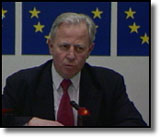
|
Farm Cash Warning as EU Aims to ExpandThe Government has welcomed plans for the biggest political shake-up in European Union history - but has admitted that there are "difficulties" which must be dealt with first.The EU Commission has recommended that Cyprus and five former Communist countries - Hungary, Poland, the Czech Republic, Slovenia and Estonia -should be admitted to the Union. The Prime Minister told MPs that the process of enlargement was "right". Mr Blair added, however, that "fundamental changes" were needed in some of the ways that Europe worked if everyone was to benefit. Chief among these was the Common Agricultural Policy, which was "a disgrace" at the moment. Negotiations on the creation of a 21-nation organisation will begin as soon as the plan is endorsed by the existing member state governments - just as Britain takes over the presidency at the start of next year. The move means sweeping changes cutting across every aspect of EU life, extending the Union behind the former Iron Curtain in the largest single expansion since it was launched in 1957 with just six member states. More than 1,200 pages of documents, together entitled Agenda 2000, were unveiled by EU Commission president Jacques Santer in Strasbourg. Mr Santer warned Euro MPs that success would require drastic changes in the running of the EU, particularly a thorough reform of the Common Agricultural Policy and a rethink of how Europe spends billions each year on its poorer regions. Farmers face drastic cuts in the generous subsidies they have enjoyed so far from Brussels for their surplus products. But countries like Britain, whose poorer regions are currently given high priority for cash aid, will rank as relatively rich alongside the eastern bloc member states who will have a greater call on the regional kitty. It is a price that successive British governments have signalled a willingness to pay in return for embracing the former communist states and pushing western democracy further eastwards.
The European Minister Doug Henderson, in Strasbourg for the launch, said the benefits would far outweigh any costs. "All of the relatively rich existing EU members - Britain is in 10th place - know that if we are to have enlargement and that the new countries are to be given assistance to reach the same economic levels as we have on average throughout the rest of the EU, then if the budget remains static there will be overall less money available for spending in the relatively rich countries. "But if one believes that there are gains in security and peace terms by having that enlargement and that it provides a good opportunity for British exporters to break into the new markets, then those gains outweigh the costs." Mr Henderson said the Government would be using its EU presidency next year to "drive the process forward". Those who doubted the benefits for Britain need only look at the boost for British exporters in Spanish markets after Spain joined the EU in the mid-1980s, he said.
Agenda 2000's analysis of the future of Europe insists on tight control on
the annual Euro budget of more than £50 billion.
|

|
| The entry of the new states will herald a shake-up in agriculture |
EU Commissioner, Sir Leon Brittan, defended the CAP reforms, saying that they were "a very big step forward in the right direction". He said the reforms discouraged production where it was not wanted while also giving support to farmers on a reduced scale. Sir Leon also praised the EU enlargement process which he sees as important for European stability, adding that the CAP reforms would aid EU absorbtion of new states.
Mr Santer insisted that there will have to be another intergovernmental conference to streamline EU decision-making, further extending majority voting and reducing the power of veto, which Britain holds dear, if an EU of 21 nations is to avoid paralysis.
Other Eastern European countries were left disappointed today. The Commission has told Latvia, Lithuania, Slovakia and Bulgaria that their applications to join the EU will be kept under annual review. Turkey, the 12th applicant, is considered nowhere near meeting the criteria of economic and political stability to be seriously considered at the moment.
Diana, Princess of Wales, 1961-1997
Conference 97
Devolution
The Archive
News |
Issues |
Background |
Parties |
Analysis |
TV/Radio/Web
Interactive |
Forum |
Live |
About This Site
News |
Issues |
Background |
Parties |
Analysis |
TV/Radio/Web
Interactive |
Forum |
Live |
About This Site
© BBC 1997 |
politics97@bbc.co.uk |

